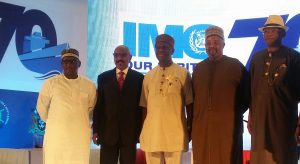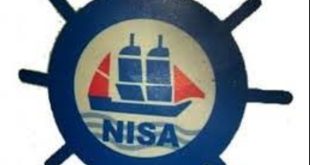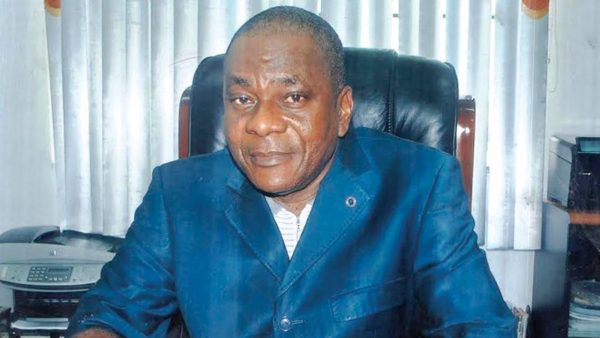-

L-R: The President of Nigerian Ship-owners Association (NISA), Alhaji Aminu Umar, the Managing Director of the National Inland Waterways Authority (NIWA) Senator Olorunnimbe Mamora, the Director General of Nigerian Maritime Administration and Safety Agency (NIMASA) Dr. Dakuku Peterside, Former Executive Secretary of Nigerian Shippers’ Council (NSC) Capt. Adamu Biu and the Executive Director, Marine and Operations at the Nigerian Ports Authority (NPA), Dr. Sekonte Davies; during the celebration of International Maritime Organization (IMO) 70th anniversary, in Lagos last week. NIMASA, NNPC Care Less
Fifteen years after the enactment of Cabotage Act, foreign shipping lines are still dominating shipping business in the country with the situation becoming more frightening as foreigners choose the local ship-owners to do business with and those to reject; while the Nigerian Maritime Administration and Safety Agency (NIMASA) and the Nigerian National Petroleum Corporation (NNPC) stand aloof.
Ship-owners expressed their displeasure over this issue at the recent celebration of the 70th anniversary of the International Maritime Organization (IMO) in Lagos, last week.
They lamented that foreign ships continue to reject Nigerian-owned vessels claiming that such vessels didn’t meet their standards while turning around to use the services of their foreign cronies despite the Cabotage Act directing that Nigeria vessels be given priority.
Explaining the ordeal of Nigerian ship-owners on the issue of ship-vetting in the country, the Chairman, Integrated Oil, Capt. Emmanuel Ihenacho, said; “If two ships want to dock; one foreign ship comes and mine is a Nigerian ship; you find the foreign ship operators insisting that they want to scrutinize my documents. What authority do they have to want to look at my documents? The authority which should look at my documents is the classification society or the class administration which is NIMASA.
Speaking further, Ihenacho drew an analogy; “The issue is like a dispute between two Nigerian citizens and one smartly acts like a Policeman and demands for the documents of the other party whereas he doesn’t have the authority to do so. You find foreigners insisting that they wouldn’t do the jobs with Nigerians and they would later nominate another foreign ship to do the same job. We lose such contracts because a law says they should look at the people to do the job but they have introduced illegal vetting. There is no need for any shipping company to vet, if my documents are correct and verified by NIMASA. NIMASA is the flag authority; hence, if my papers are correct as per NIMASA, they can’t claim to know better than the flag administration”

Meanwhile, the President of Nigerian Indigenous Ship-owners Association (NISA) Mr. Aminu Umar lamented that NNPC have accepted the notion that Nigerian ships aren’t good enough for the carriage of liquid cargoes.
Umar argued that he could identify several real Nigerian ship owners who have participated in crude affreightment in the past but he lamented that the procedures and payments for the charter weren’t supportive to encourage indigenous players.
Since the foreign ship-owners have become prominent for rejecting Nigerian vessels already certified by NIMASA, experts called for a third party or the classification society to be saddled with the responsibility of inspecting Nigerian vessels to see if the vessels meet the requirement.
“We have had several cases where a Nigerian vessel ought to do a business with a Greek vessel and the Greek vessel rejects the Nigerian party and eventually does the business with another Greek vessel” Ihenacho said.
Noting that carriage of liquid cargoes by local ship owners has become a nightmare because of the flagrant abuse of waiver clause in the Coastal and Inland Shipping Act 2003 enjoyed by foreign shipping lines, Engr. Oliver Ogboagu stressed that such act in favour of foreign ships was illegal.
“Foreigners are rejecting Nigerian vessels frivolously only to partner with foreign vessels was against Cabotage Act which is under NIMASA. The tender NNPC is issuing is also a breach to Nigerian laws because the Cabotage stipulates that 50% of the bulk cargo must be lifted by Nigerian vessels.
“The act was established to promote indigenous shipping but in contradiction, foreign liners are the ones benefitting from the country’s coastal trade. NNPC is one of the agencies hindering the growth of indigenous shipping because what we have in the country is crude cargo and if you continue to deny us access to these cargoes, the Nigerian maritime industry wouldn’t grow” he said.
Speaking on behalf of NNPC, the General Manager, Commercial Shipping, Mr. Ibrahim Lamin, stressed that the responsibility of choosing the ships to partner with in the vetting process, rests squarely on the foreign ships.
Ship Vetting is a risk assessment process carried out by charterers and terminal operators in order to avoid making use of deficient ships or barges when goods are being transported by sea or by inland waterways.
The vetting inspection is a grading system of a ship, enabling a potential charterer to compare between similar ships and choose the best for his needs in order to maximize efficiency. For vetting purposes a vessel does not pass or fail an inspection, but the inspection forms part of the overall screening process.
By Kenneth Jukpor
 MMS PLUS NG – Maritime, Aviation, Business, Oil and Gas News Online Newspaper with coverage in Maritime, Oil and Gas, Aviation, Power and Energy as well as Financial News
MMS PLUS NG – Maritime, Aviation, Business, Oil and Gas News Online Newspaper with coverage in Maritime, Oil and Gas, Aviation, Power and Energy as well as Financial News









